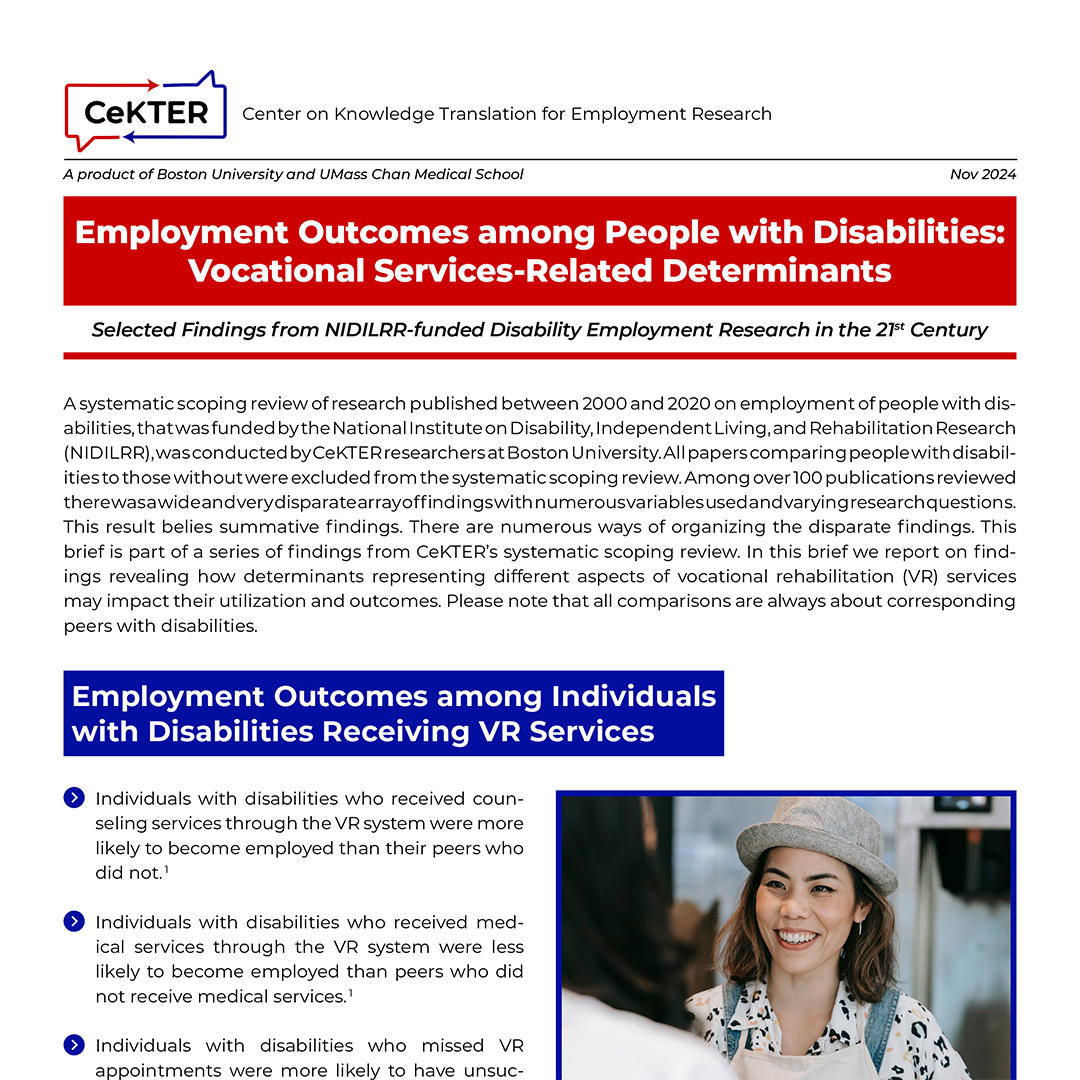Page Menu
Developed Outputs
The following is a full listing of resources that we developed. Our outputs include briefs, reports, tipsheets, short videos, and webinars.
-
Wednesday, November 12, 2025
![thumbnail of the brief its all text]()
By: Zlatka Russinova, PhD, Philippe Bloch, M.Ed, Anneliese de Wet, PhD and Alex Shulman
This brief is part of a series of findings from the center’s systematic scoping review. In this brief, we report on findings about determinants impacting the employment outcomes among youth and young adults with disabilities. Please note that all comparisons are always about corresponding peers with disabilities.
-
Friday, May 09, 2025
![male sitting on the couch blowing his nose]()
By: Zlatka Russinova, PhD, Philippe Bloch, M.Ed, Anneliese de Wet, PhD and Alex Shulman
-
Wednesday, April 09, 2025
![thumbnail of brief its all text]()
By: Zlatka Russinova, PhD, Philippe Bloch, M.Ed, Anneliese de Wet, PhD and Alex Shulman
In this brief, we report on findings about employer-related determinants impacting the employment of people with disabilities, including the hiring and retention of employees with disabilities. Please note that all comparisons are always about corresponding peers with disabilities.
-
Thursday, March 13, 2025
![thumbnail of brief]()
By: Zlatka Russinova, PhD, Philippe Bloch, M.Ed, Anneliese de Wet, PhD and Alex Shulman
In this brief, we report on findings about a range of psychosocial determinants that impact the employment of people with disabilities, including determinants related to individual-level psychological characteristics, interpersonal skills, and social support. Please note that all comparisons are always about corresponding peers with disabilities.
-
Thursday, March 13, 2025
![thumbnail of brief]()
By: Zlatka Russinova, PhD, Philippe Bloch, M.Ed, Anneliese de Wet, PhD and Alex Shulman
This brief is part of a series of findings from CeKTER’s systematic scoping review. In this brief, we report on findings about a range of work-related determinants impacting the employment of people with disabilities, including work history, accommodations, and workplace supports. Please note that all comparisons are always about corresponding peers with disabilities.
-
Wednesday, February 19, 2025
![thumbnail of webinar title slide its all text]()
This webinar presents highlights from StatsRRTC's Disability Statistics Collection, including data on disability employment rates in rural America and among Black Americans with disabilities.
-
Wednesday, February 19, 2025
![rural neighborhood with text overlay]()
This video highlights information from the Disability Statistics Collection funded by the Disability Statistics and Demographics Rehabilitation Research and Training Center (StatsRRTC) developed by the University of New Hampshire Insitute on Disability.
-
Wednesday, February 19, 2025
![Brief: Statistics That Can Shape Disability Policy]()
Policy makers need disability statistics to determine whether, or what, new policy approaches are needed. Led by the University of New Hampshire, the NIDILRR-funded Rehabilitation Research and Training Center on Disability Statistics and Demographics (StatsRRTC) is a collaboration of the American Association of People with Disabilities (AUCD), Kessler Foundation, and Mathematica Policy Research. StatsRRTC's Disability Statistics Collection provides a singular location to obtain and compare the most recent federal, state, and county level disability statistics. This brief highlights just a few of the statistics can be that can be found through the work of StatsRRTC.
-
Tuesday, January 21, 2025
![thumbnail of brief - its all text]()
By: Zlatka Russinova, PhD, Philippe Bloch, M.Ed and Anneliese de Wet, PhD
This brief is part of a series of findings from CeKTER’s systematic scoping review. In this brief, we report on findings about a range of work-related determinants impacting the employment of people with disabilities, including work history, accommodations, and workplace supports. Please note that all comparisons are always about corresponding peers with disabilities.
-
Tuesday, November 05, 2024
![thumbnail of brief]()
By: Zlatka Russinova, PhD, Philippe Bloch, M.Ed and Anneliese de Wet, PhD
A systematic scoping review of research published between 2000 and 2020 on employment of people with disabilities, that was funded by the National Institute on Disability, Independent Living, and Rehabilitation Research (NIDILRR), was conducted by CeKTER researchers at Boston University.









